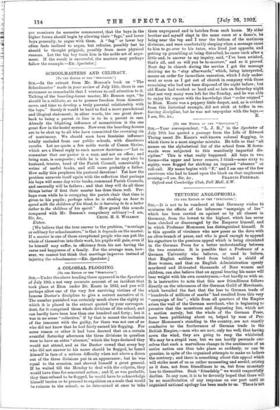SCHOOLMASTERS AND CELIBACY. [To THE EDITOR OP THE " SPECTATOR."
J SIR,—In the extract from Mr. Benson's book on " The Schoolmaster" made in your review of July 12th, there is one statement so remarkable that I venture to call attention to it. Talking of the boarding-house master, Mr. Benson says, " he should be a celibate, so as to possess freedom from domestic
cares, and time to develop a truly parental relationship with the boys." Surely it would be hard to find a more paradoxical and illogical statement; in other words, the one great draw- back to being a parent in loco is to be a parent in ease. Already the blighting influence of monasticism is the one great flaw in the hostel system. Now even the boarding-houses are to be shut up to all who have committed the crowning sin of matrimony. We should soon have feminine influence totally excluded from our public schools, with disastrous results. Let me quote a few noble words of Canon Skrine, which are a liberal reply to such narrow doctrines :—" Let us remember that our pastor is a man, and not an office ; and being man, is composite ; while he is master he may also be husband, trustee, head of the Parish Council, conceivably a writer of useful books, and still more probably a father. How sadly this perplexes his pastoral devotion! Yet how the problem unravels itself again with the reflection that perhaps his boys will some day write books, command Parish Councils, and assuredly will be fathers ; and that they will do all these things better if first their master has done them well. Per- haps even while he is occupying the parish chair that time is given to his pupils ; perhaps when he is stealing an hour to spend with the children of his blood, he is learning to be a better father to the children of his spirit." How grand this sounds compared with Mr. Benson's compulsory celibacy !—I am, Elstow.
[We believe that the true answer to the problem, "marriage or celibacy for schoolmasters," is that it depends on the master. If a master is one of those exceptional people who can put the whole of themselves into their work, his pupils will gain, even if he himself may suffer, in efficiency from his not having the cares and happiness of a family. For the average man, how- ever, we cannot but think that marriage improves instead of injuring the schoolmaster.—En. Spectator.]






































 Previous page
Previous page